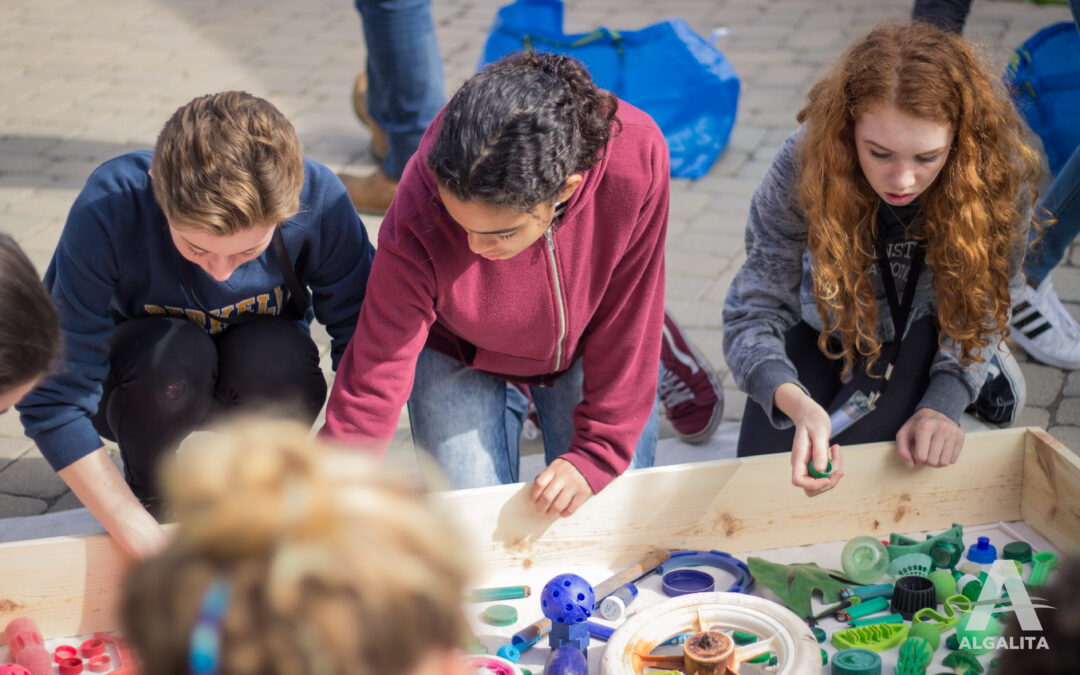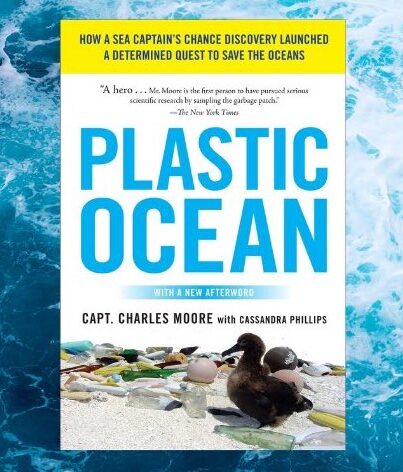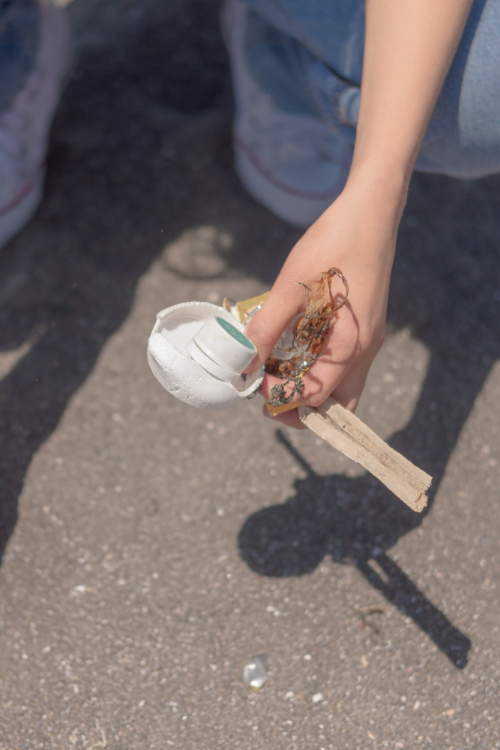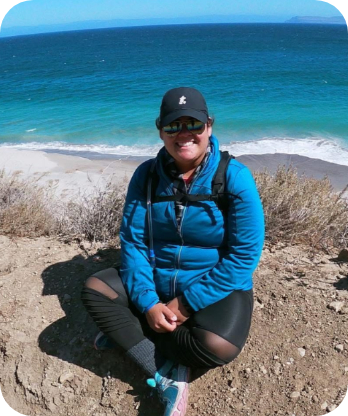
How-to Guide
Our inspiration for Wayfinder Society and the Student Hub was our desire to make taking action on plastic pollution easier, more rewarding, and a positive, shared experience. The global environmental and social issues that we face today impact every one of us, so we need all hands on deck. But the ways to take action aren’t always very obvious, and sometimes, especially for students, they feel abstract or inadequate when we feel like we are doing them alone. So, that’s where Wayfinder Society’s Student Hub comes in.
Taking Action on Plastic Pollution
The Student Hub consists primarily of 35 Actions for taking action on plastic pollution.
To help students identify how they can best contribute to the solution with their specific skills, goals, and time constraints in mind, the Actions are categorized in a couple ways. First by range of impact – home, school, community, and beyond, second by goal, and third by how long they take to complete, which is also how many Hours can be earned – from 1 to 12 hours.
In each Action, we’ve stated the mission, background information about why the Action is impactful, and step-by-step directions. We’ve also included tips and suggestions to help students complete the Action successfully.
Do my students need to create an account?
No, unless they want to officially track their Actions and earn Hours. Educators can also use the Actions as ideas for class assignments and projects. Students can also use them without creating accounts as guidance for community projects, or inspiration for what they want to accomplish with their Green Team or Environment Club during the school year.
What if I want to have all of my students create accounts to track their Actions?
Use our Class Accounts option to streamline the process. Start by completing the Class Code Request form. We’ll send your code(s) and provide a special link to the signup page for your students. (Don’t use the Individual Account option.)
They’ll need to sign up with their unique email, however, they won’t need to access their email to use the program.
Once your students have created their accounts, they can submit their work in the Track Your Contribution section of each Action.
Each time a student submits the Track my Contribution form to show they’ve completed an Action, the Wayfinder Society team will review the submission. If approved, the student will see the Action in the Completed Achievements section of their profile and the corresponding number of Hours will be added to their Hour total. If rejected, they will receive a message in their profile with individualized feedback on what to do to improve their submission. Each Action can only be earned once, but a student can submit multiple times until the submission is approved. Students will receive email notifications about new messages and approved Actions.
How we support students taking action on plastic pollution
Recognition
Each time a student submits proof of completing an Action, a team member at Algalita reviews the submission. When a submission is approved, the student will see the Hour added to their total, and the Action will appear in the list of completed Actions in their profile.
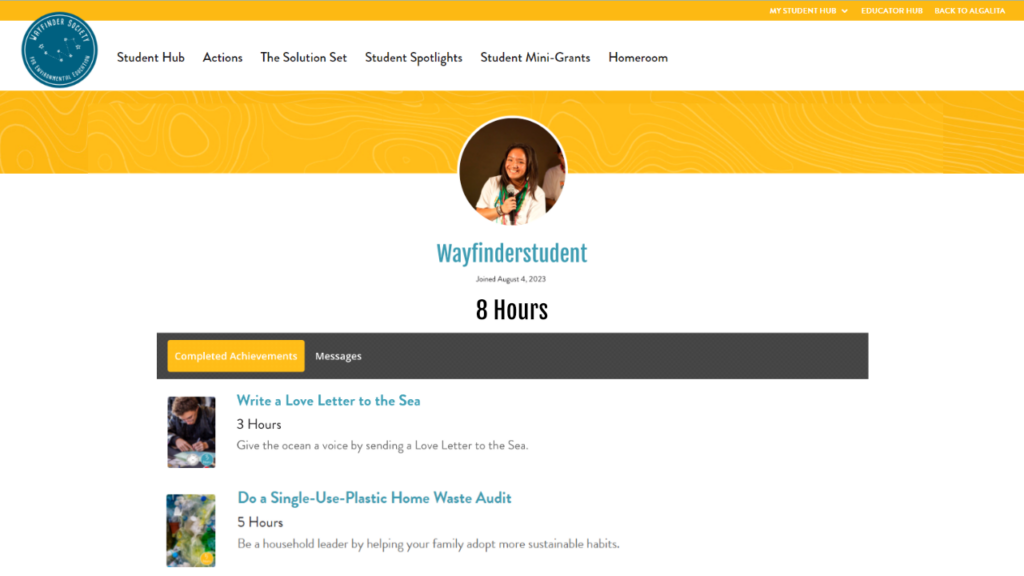
Individual Feedback
For incomplete or inadequate submissions, the Algalita team will provide direct feedback to the Student through the Messages Tab in their Profile. If a student needs assistance in completing an Action, they can use the Get Help form to ask for clarification and support. The Algalita Team will respond by email to help the student.
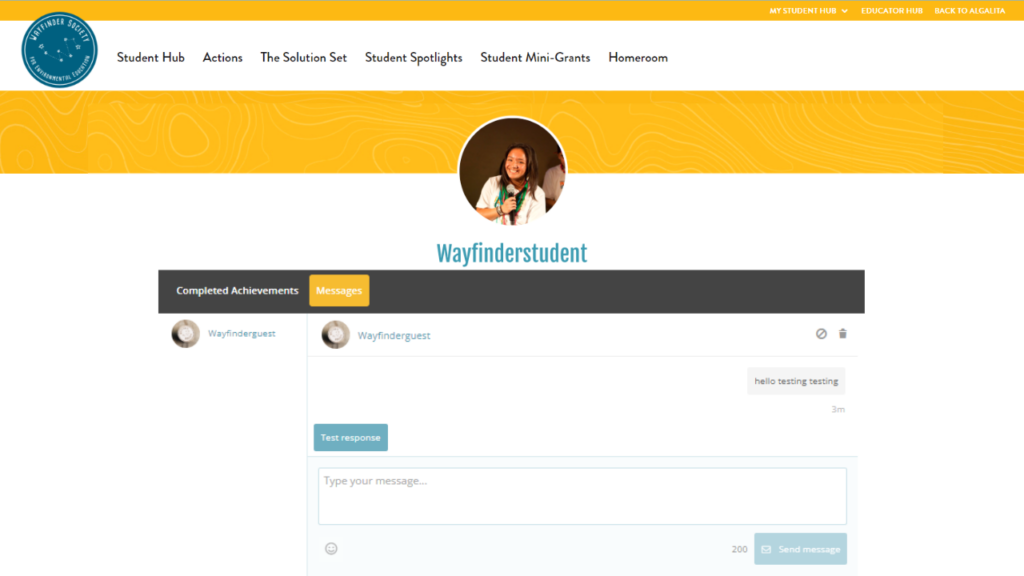
Official Certificate of Hours Completed
Students with active accounts may request a signed certificate of achievement outlining their Hours contributed to addressing plastic pollution, and an official list of Actions they’ve completed, using the Certificate Request Form. These official certificates can be mailed on request within the US.
Student Mini-grant and Student Spotlights
Through Wayfinder Society Student Mini-grants, students can apply for financial support for their school or community project related to plastic pollution or they can apply for funding to help with continuing their education in the plastic-pollution-related areas! Some examples:
- A student is planning a community event to educate about plastic pollution but needs to cover a rental fee for the event space.
- A student needs funding to travel to a conference or event on social impacts plastic pollution.
- A student is accepted into an unpaid internship and needs financial support to be able to participate.
- A student is starting a small business to provide local access to zero-waste products or food. We will be opening up the Student Mini-grant applications in Spring of next year.
Student Mini-grants will be awarded in late Spring and will require awardees to report on how they used the grant.
Learn more about Student Mini-Grants
The Student Hub will also be a space to celebrate the incredible students who are creating change in their communities. Our Student Spotlights will highlight students doing exceptional work in their communities. Educators, this collection of videos and articles spotlighting students are a great resource for students looking for inspiration for their next project.
5 ways for educators to use the Student Hub
Here are some suggestions for how educators can use the Student Hub to empower their students:
1 – Dedicated Student: Do you have a self-directed student who is passionate about sustainability and would benefit from extra support and guidance. Show them the Student Hub and the option for creating an individual account. Some examples are a Girl Scout student planning to do their Gold Award, a high school student applying for college and looking for ways to improve their extracurricular components, or a student with community service requirements for school who is looking for ways to serve their community. These dedicated students are also the perfect candidates for our Student Mini-grants. Please share this opportunity with them.
2 – Offer Extra Credit: As a component of your Human Impacts unit, offer students who complete 5 Hours through Wayfinder Society 50 extra credit points. To verify completion, students log in to their accounts to show you the Completed Achievements Tab in their profile showing the Actions and Hours they’ve completed. If you have each student create an account, use our class code request form to receive Class Codes and a simplified sign up for your students that doesn’t require email activation.
3 – Project Inspiration: Use an Action as inspiration for a class project for your students to make their school less dependent on plastic. Students don’t create accounts. Instead, just use the editable downloads and Action content to develop a project outline for your students.
4 – Green Team Group Account: Are you supervising the Green Team at your school site? Have the club check out the Wayfinder Society Student Hub for ideas and guidance on what they might want to accomplish that year. They can create a Team Account, managed by the Green Team student president or secretary. The students work together to complete Actions throughout the year, focusing on the school-related Actions.
5 – Inter-classroom Competition: Challenge the other educators in your science department to see who’s class can complete the most Actions. Start by using some of our educational resources to introduce the problem of plastic pollution, and have students explore The Solution Set for inspiring stories about companies, organizations and individuals leading the way to a world where plastic pollution is unthinkable. Then each class creates a Team Account. Select a student to manage each account for the class. That student will be responsible for entering the Actions completed by the class.
Why we created the Wayfinder Society Student Hub
As long as we’ve been doing this work of educating about plastic pollution, people have wanted to know what they can do to solve this problem that affects all of us. After using our Lessons and Toolkits to teach about environmental problems in your class, you and your students will likely want to know what to do to make a positive change. We believe that young people around the globe taking collective action, in their homes, communities, schools, and governments, is a powerful force for change. This kind of community-based action is key to creating sustainable, just transition towards a cleaner, safer future with less plastic.
Over the years, we’ve worked with countless students as mentors for their school, scout group, and passion projects. We wanted to create a place to help more students to make amazing changes in their communities, and we wanted to formally recognize and celebrate each individual who is involved in this massive effort. It was important to us to make it easy and straightforward for young people to see that these small actions, collectively, lead to big changes. We also find it crucial to cultivate critical thinking skills, and to recognize that learning about this issue is taking action. Because our challenges with plastic are rooted in politics, economics, and social systems, the solutions are just as complex and abstract. Our Wayfinder Society Student Hub helps students participate in making local impact on these complex systems.
We hope that the Wayfinder Student Hub will be a source of guidance, inspiration, and celebration for the young people who are passionate about this problem.
Ready-to-Use Lessons with Editable Handouts
Our standards-aligned lesson plans incorporate real-world scientific research and data. They were written together with experts in the field and educators in our network. Our hands-on lessons include easily editable handouts, keys, and student worksheets to fit any classroom.
Hands-On Science Toolkits with Materials Included
Our reusable, zero-waste toolkits provide educators with out-of-the-box real-world science and social science labs that help students explore environmental issues. They include all but the most easily found materials.
Immersive Educational Videos
Our educational videos help bring environmental issues to life. Filmed during our organization's 10 ocean expeditions, they provide a close up view of the ocean plastic pollution problem. Bring your students on a virtual experience, and use our journaling and discussion questions to dive in deeper.
Standards-Alignment Guides
Our guides explain how our resources fit into Next Generation Science Standards and the Advanced Placement Environmental Science (APES) course outline. Our How-to Guides give helpful tips and ideas for getting started.
Student Hub with Community Action Projects
Task students with turning their knowledge to action with over 30 project ideas. Students can submit their projects for hourly credits to use on college applications, resumes, and community service requirements.
Student Project Financial Support
Our Student Mini-Grants are awarded once a year to support students who need funding for community projects or pursuing their education goals related to taking action on plastic pollution and related issues.
Funding For Educators
We know teaching effective environmental education often requires extra materials and funding. Get support through our unrestricted Educator Mini-Grants awarded every other month.
Educator Development
In addition to our teaching resources, we're committed to building up our educator community through virtual events with guest speakers from our movement.
Uplifting Everyday Leaders in Environmental Education
Our Educator Spotlight articles highlight the incredible work being done by environmentally-minded teachers around the world. Get inspired with ideas to incorporate in your own classroom.

